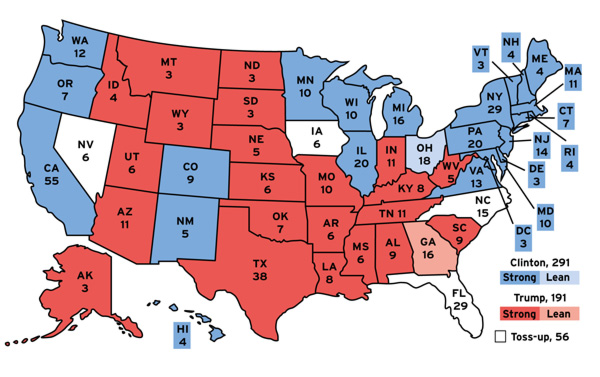Clinton on Track to Win 2016 Presidential Election
Trump can win the White House, but faces an uphill climb.

Profit and prosper with the best of Kiplinger's advice on investing, taxes, retirement, personal finance and much more. Delivered daily. Enter your email in the box and click Sign Me Up.
You are now subscribed
Your newsletter sign-up was successful
Want to add more newsletters?

Delivered daily
Kiplinger Today
Profit and prosper with the best of Kiplinger's advice on investing, taxes, retirement, personal finance and much more delivered daily. Smart money moves start here.

Sent five days a week
Kiplinger A Step Ahead
Get practical help to make better financial decisions in your everyday life, from spending to savings on top deals.

Delivered daily
Kiplinger Closing Bell
Get today's biggest financial and investing headlines delivered to your inbox every day the U.S. stock market is open.

Sent twice a week
Kiplinger Adviser Intel
Financial pros across the country share best practices and fresh tactics to preserve and grow your wealth.

Delivered weekly
Kiplinger Tax Tips
Trim your federal and state tax bills with practical tax-planning and tax-cutting strategies.

Sent twice a week
Kiplinger Retirement Tips
Your twice-a-week guide to planning and enjoying a financially secure and richly rewarding retirement

Sent bimonthly.
Kiplinger Adviser Angle
Insights for advisers, wealth managers and other financial professionals.

Sent twice a week
Kiplinger Investing Weekly
Your twice-a-week roundup of promising stocks, funds, companies and industries you should consider, ones you should avoid, and why.

Sent weekly for six weeks
Kiplinger Invest for Retirement
Your step-by-step six-part series on how to invest for retirement, from devising a successful strategy to exactly which investments to choose.
With just over two months until Election Day, the race for the White House is Democrat Hillary Clinton’s to lose.
That’s not an endorsement, just straight talk about the probable outcome of the November 8 contest, without playing favorites or telling you what editors of The Kiplinger Letter think you want to hear.
It takes 270 electoral votes to win, and Clinton is on pace for at least 291. Donald Trump will claim at least 191, with 56 up for grabs in four states that are too close to include in a forecast. But even if Trump wins all four toss-ups — Florida, North Carolina, Iowa and Nevada — he needs to take at least 23 electoral votes from Clinton to give him a narrow victory. Sweeping the toss-up states won’t be easy; he’s leading, narrowly, only in North Carolina.
From just $107.88 $24.99 for Kiplinger Personal Finance
Become a smarter, better informed investor. Subscribe from just $107.88 $24.99, plus get up to 4 Special Issues

Sign up for Kiplinger’s Free Newsletters
Profit and prosper with the best of expert advice on investing, taxes, retirement, personal finance and more - straight to your e-mail.
Profit and prosper with the best of expert advice - straight to your e-mail.

Trump can still win, but he’s quickly running out of time.
To keep Democrats from winning a third straight presidential term for the first time since 1940, Trump first needs solid performances in the upcoming debates, especially the first one in late September. Debates are always vital, but this one is especially important since Trump trails Clinton by five points or so in most national polls, and because early voting will be starting in some states at about the same time that millions of Americans tune in to the face-off.
But that’s a tall order, for sure. Clinton is a seasoned debater, and Trump won’t have a TelePrompTer to help stay on script. Plus, unlike in his debates in the primary, Trump and Clinton are likely to be the only candidates on stage. Green Party candidate Jill Stein, in low single digits in most polls, has no chance of meeting the 15% threshold to be on stage, and Libertarian Gary Johnson, in high single digits, is a long shot.
Trump, of course, could also benefit from some unforeseen development — a medical scare for Clinton, perhaps, or some new hint of scandal that pushes Clinton voters toward Trump or causes them to stay home on Election Day. October surprises do happen but can’t be counted on as campaign strategy.
And Trump, of course, could just as easily be the one who stumbles, turning the race into a rout.
The map above shows where Kiplinger editors expect the states to wind up on November 8, not where they stand today. So there are some differences from current polls. Georgia, for example, is a statistical tie, but we think Trump will prevail. And Clinton has a small lead in electoral-vote-rich Florida, but we expect that gap to narrow.
Neither candidate leaves large numbers of voters with warm, fuzzy feelings. Unfavorable ratings have never been this high for both major party candidates, and many folks say their votes will be as much against one candidate as in favor of the other.
Clinton’s strongholds: The Northeast, Upper Midwest and the West Coast, with Colorado, New Mexico and Hawaii tossed in. We see Clinton prevailing in 23 states and Washington, D.C. Trump has the advantage in 23 states, mostly in the Mid-South and the West.
Even if Trump had avoided recent stumbles and had run a stronger campaign, he might still be in difficulty. Democrats hold a sizable edge over Republicans in voter registration. And, with the exception of Texas and Florida, Democrats tend to dominate bigger states with larger numbers of electoral votes.
Changes in demographics favor Democrats, too. The rising percentage of Hispanics, for instance, helps Clinton in Colorado, Arizona, Nevada and Florida. Hispanics generally tilt toward Democrats. This year, with his strong stance against illegal immigration, Trump is likely to do worse than usual with them. Plus more women than men vote in presidential elections, and they vote for Democrats in general in greater numbers than men do. So far, more women prefer Clinton.
At the moment, national polls are tightening a bit, and it wouldn’t be a surprise to see that trend continue. But this isn’t a national race, it’s a series of state races. So far, most swing states are still firmly in Clinton’s corner.
Barring some big changes, it may be a long four years for the GOP.
Kiplinger reporter Matthew Housiaux contributed to this report.
Profit and prosper with the best of Kiplinger's advice on investing, taxes, retirement, personal finance and much more. Delivered daily. Enter your email in the box and click Sign Me Up.

-
 5 Vince Lombardi Quotes Retirees Should Live By
5 Vince Lombardi Quotes Retirees Should Live ByThe iconic football coach's philosophy can help retirees win at the game of life.
-
 The $200,000 Olympic 'Pension' is a Retirement Game-Changer for Team USA
The $200,000 Olympic 'Pension' is a Retirement Game-Changer for Team USAThe donation by financier Ross Stevens is meant to be a "retirement program" for Team USA Olympic and Paralympic athletes.
-
 10 Cheapest Places to Live in Colorado
10 Cheapest Places to Live in ColoradoProperty Tax Looking for a cozy cabin near the slopes? These Colorado counties combine reasonable house prices with the state's lowest property tax bills.
-
 Kiplinger's 2020 Election Forecast
Kiplinger's 2020 Election ForecastPolitics For nearly a century, The Kiplinger Letter has forecasted the outcome of presidential elections to keep readers informed of what's coming and what it means for them. Here's our call for 2020.
-
 How the GOP Tax Bill May Affect Businesses
How the GOP Tax Bill May Affect BusinessesBusiness Costs & Regulation Corporations would enjoy a lower flat tax rate while individual owners of pass-throughs would also see a lower rate, but with more complex terms.
-
 The Long Slog in Congress After Comey
The Long Slog in Congress After ComeyPolitics Trump's firing of the FBI director ruffled congressional feathers, but not enough to spur an independent investigation into Russian meddling in the 2016 U.S. election.
-
 Trump’s Tax Reform Plan Faces Tough Challenges
Trump’s Tax Reform Plan Faces Tough ChallengesPolitics A one-page outline isn't enough to satisfy a Congress interested in the details — and protecting constituents.
-
 Trump's Agenda and Challenges
Trump's Agenda and ChallengesPolitics What lies ahead for the President-Elect.
-
 New Overtime Rules Will Hit Businesses This Year
New Overtime Rules Will Hit Businesses This YearBusiness Costs & Regulation A change in salary threshold will make more workers eligible for extra pay.
-
 Bumpy Road Ahead in 2016 Presidential Race
Bumpy Road Ahead in 2016 Presidential RacePolitics Trump will get a bounce after the Republican convention, but Clinton is poised to regain ground.
-
 Why Trump Will Win the GOP Presidential Nomination
Why Trump Will Win the GOP Presidential NominationPolitics Republican leaders worry he will hand the White House to Hillary Clinton, but they waited too long to try to stop him.